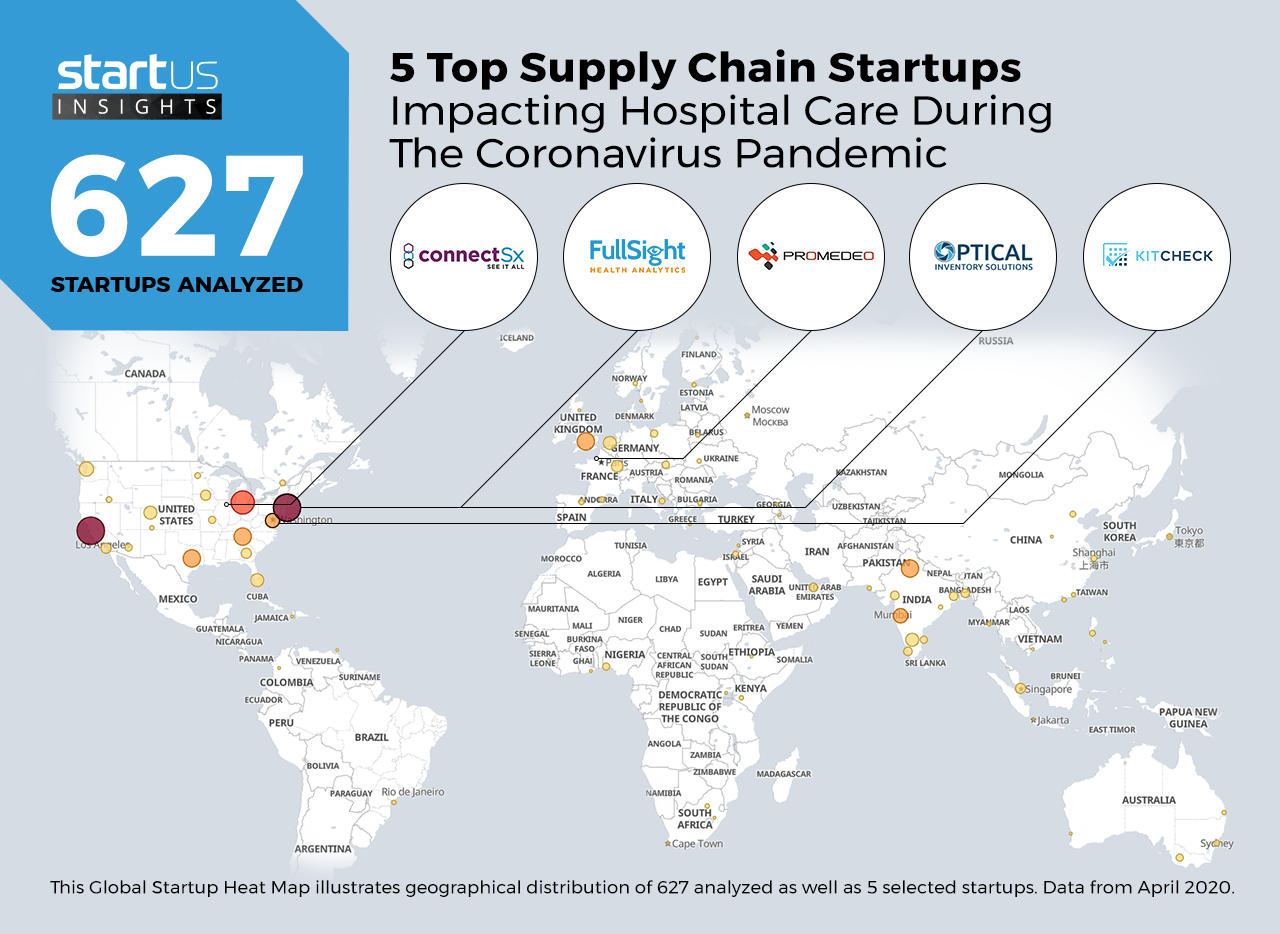Our Innovation Analysts recently looked into emerging technologies and up-and-coming startups working on emerging solutions that mitigate the effects of the coronavirus pandemic on hospitals. Here, we are taking a look at promising hospital supply chain startups.
Heat Map: 5 Top Hospital Supply Chain Startups
We use a data-driven startup scouting approach to identify the most relevant solutions globally. The Global Startup Heat Map below highlights interesting examples out of 627 relevant solutions.
ConnectSx – End-To-End Inventory Visibility
A sudden increase in medical inventory consumption is expected in times of global outbreaks like COVID-19. End-to-end inventory visibility enables hospitals to track and monitor important resources including beds, mobile scanners, surgical equipment, and consumables. Startups and emerging companies work on solutions that support hospitals in managing their cost, efficiency, and accountability. As a result, hospitals are able to provide better quality healthcare using RFID, barcodes, and holograms to track their inventory.
The US-based startup ConnectSx provides inventory management solutions for hospitals. The startup’s mobile application allows users to scan, identify and categorize surgical equipment based on RFID. The app’s intuitive mobile interface manages and reports on the surgical inventory used in the operating room. In addition, it tracks the lifecycle of medical devices to monitor and reduce surgical waste.
FullSight Health – Real-Time Inventory Tracking
Hospitals usually are restrained with limited inventory in the event of a global medical emergency. This creates a need to judiciously use the available inventory such as drugs, needles, masks, medical clothing, gloves, etc. Managing demand and supply becomes critical in delivering better healthcare. Moreover, real-time inventory tracking algorithms help hospital managers remain vigilant with resource procurement and allocation.
FullSight Health, a USA-based startup, supports hospital pharmacies better manage their drug and medication inventories. Using artificial intelligence (AI) and machine learning techniques, the software analyzes consumption trends and medical dispensing trends. Additionally, the startup provides insights like real-time inventory levels to improve the accuracy of predicting stock-outs, in turn, helping hospitals to operate more efficiently.
Promedeo – Smart Cabinets
Hospital pharmacies work overtime during medical crises such as the coronavirus pandemic to stock necessary inventory in a swift and efficient manner. Smart cabinets track usage of medical inventory, and their lifecycle, using RFID, barcodes, and holograms. As a result, startups and emerging companies develop AI-enhanced solutions that improve accountability and compliance with regards to hospital inventory.
The French startup Promedeo provides hospitals with smart cabinets to organize and automate medical inventory tasks. Using barcodes and RFID labeling the product details are tracked in real-time. This frees up valuable time for the hospital workforce in addition to eliminating low value-added tasks like manual counting.
Optical Inventory Solutions – Optical Character Recognition-Based Analytics
Hospitals rely heavily on their supply chains in times of global pandemics. Managing the inventory becomes key in tackling difficult situations like stockouts and overuse of certain essential inventory. Besides, manual inventory keeping is less effective and demands significant time from hospital staff. Employing optical character recognition (OCR)-based analytics to automate inventory audits enables nurses and other hospital staff to focus on more essential tasks.
Optical Inventory Solutions, a US-American startup, develops the hardware and software to automate existing medical refrigerators for hospitals. Using a combination of the internet of things (IoT) and cameras, the solution identifies, records, and re-records all various medicinal requirements based on any infectious outbreak. This reduces the manpower involved in the supply chain and makes it more agile.
Kitcheck – Automated Restocking For Emergency Rooms (ERs)
Emergency rooms require careful prior preparation in order to tackle difficult outbreaks, like the COVID-19 pandemic. Medical inventory and supplies in a hospital’s emergency room require regular monitoring and restocking. Automating inventory restocking allows hospitals to improve their response time in the emergency room. In addition, automation reduces the time spent by hospital staff and nurses on non-essential tasks such as stacking and counting.
The US-based startup Kitcheck builds automated restocking solutions for hospitals with regards to crash cart management. The startup’s solution streamlines inventory management for hospitals, and in particular, the emergency room. Scanning stations use RFID to track various essential supplies such as valve masks, syringes, emergency medication, surgical tools, and IV lines in order to provide real-time relevant data about the crash cart. As a result, the ER staff can quickly identify missing or incorrect items from the crash cart and make the necessary replacements.
How To Flatten The Curve?
This is an unprecedented situation for many of us across the world. The SARS outbreak in the early 2000s claimed 774 lives. That toll was enough to drive research & development in technology-driven healthcare solutions. The fact that several mobile health, e-health, remote health, and diagnostics startups and emerging companies are able to respond during a real epidemic is encouraging. With tens of thousands of deaths already, we expect to see numerous new companies offering technology-driven solutions to help doctors, nurses, other health workers, and the larger public.









